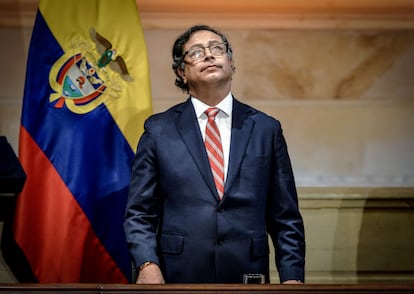Gustavo Petro’s presidency: one year of the rise and fall of change
An ambitious government, with political and economic achievements in its first semester, lost momentum in its second, which has been full of scandals, political conflict and mistrust


Gustavo Petro assumed the presidency a year ago amidst a huge wave of illusion. He was the first president elected by a left-wing party in the 200-year history of a presidentialist country. He represented change like few others: a guerrilla in his youth, an opposition politician for 30 years, a symbol of the debates against paramilitarism and its symbiosis with the political class in many regions. He also was accompanied by an Afro woman born into poverty in a historically marginalized area, Francia Márquez, as vice-president.
It was the beginning of an era, one that mattered to everyone in the country. Petro arrived with extremely high expectations, a 62% favorability -for a country that was disbelieving and that contrasted with the 33% of the outgoing Iván Duque- and an almost unanimous support for some of his first announcements, such as reforming the health system, achieving an energy transition to decarbonize Colombia or relations with neighboring Venezuela.
The emotion was evident in the installation ceremony, a colorful party. And, as his first determination as president, Petro asked the military to bring him the sword of Simón Bolívar, the same sword that had been stolen in 1974 by the guerrilla group in which he was a militant (M-19), and returned to the State when its members disarmed and reincorporated into civilian life.
“We are going to build a great national agreement to set the roadmap for Colombia in the coming years”, he announced in his speech. The left had not obtained majorities of its own in Congress that would last his entire four-year term, so this national agreement had as its first and great test the fact that Petro managed to weave a broad legislative coalition. It included traditional parties that had been his political rivals for decades, such as the centenary Conservative Party, and it had been achieved thanks to the conciliatory mood shown by the president in his last months as candidate and to the fact that several former members of those parties had joined his party and had even assumed key roles in the campaign. This majority elected two Petrista congressmen at the head of the legislative chambers, with which he had a clear front to push forward the desired reforms.
The first months showed a Colombia on the road to the promised change. Petro pushed forward with unprecedented speed a progressive tax reform, which gave the Government more resources to implement the announced social programs; he launched the ambitious policy of total peace, which proposes to negotiate in parallel with small and large armed groups, of political or non-political origin, to achieve the longed-for cessation of violence; he reactivated relations with Venezuela, appointing as ambassador Armando Benedetti, one of the first politicians who had jumped from the traditional parties to Petrismo, and who had been his chief debater during the campaign. In addition, Petro began to assume a leadership role in the continental left and even in global forums, as in the resounding intervention at the UN assembly in which he demanded an end to the war on drugs.
That initial momentum, however, began to fade due to internal factors. Starting with his own mistakes, as when the President announced, in the midst of the January 1st celebrations, that the Government had achieved a breakthrough in peace, the agreement of a ceasefire with the National Liberation Army, the last guerrilla in arms in Colombia. The guerrillas denied it. Although the negotiation continued and this Thursday, eight months later, the ceasefire began, the damage to credibility remained.
Then it was politics. The government took six months to cook up proposals to change the social security system, with a pension reform, a labor reform and a health reform. The latter was the cause of fierce internal discussions, with the Minister of Health leading a change to move insurance from public or mixed entities known as EPS to a single state entity, and several Cabinet colleagues against it. Petro presented the Health Minister’s idea, but in Congress several parties of the coalition opposed it. After two months of debates and friction, both the Minister of Health and those who had opposed her idea, as well as those representing the allies in Congress, left the government. The coalition died, and the reforms stalled.
But two scandals have marked the decline in the last few months. The Chief of Staff Laura Sarabia, who had come to the Government after working with Armando Benedetti, suffered a money robbery at her home. The private event escalated after the police officers guarding the presidential palace intervened in the investigation. In an unexpected twist, Benedetti exposed himself by leaking audios of his own in which he talks about mistreatment by Petro and Sarabia, and mentioned an illegal financing of the campaign in his native Caribbean coast.
The second case is that of a marital problem of Nicolás Petro, first-born son and political figure of the president in the same region. His ex-partner publicly revealed that Nicolás had obtained unreported financing for the campaign, including from an ex-narco, and had pocketed it; last Thursday, the Prosecutor’s Office revealed that Nicolás has said that part of the money went to the campaign. Although yesterday he claimed that his father did not know about the entry of shady money, and has not given proof of his claims, the president remained on the defensive.
Hope no longer marks the country. In recent polls, the president only appears with between 35% and 40% of support and the majority responds that the country is going badly. In less than three months the regional elections will be held, and the left has few options to come out stronger. Change no longer has the wind at its back. There are three years left to see the results.
Sign up for our weekly newsletter to get more English-language news coverage from EL PAÍS USA Edition
Tu suscripción se está usando en otro dispositivo
¿Quieres añadir otro usuario a tu suscripción?
Si continúas leyendo en este dispositivo, no se podrá leer en el otro.
FlechaTu suscripción se está usando en otro dispositivo y solo puedes acceder a EL PAÍS desde un dispositivo a la vez.
Si quieres compartir tu cuenta, cambia tu suscripción a la modalidad Premium, así podrás añadir otro usuario. Cada uno accederá con su propia cuenta de email, lo que os permitirá personalizar vuestra experiencia en EL PAÍS.
¿Tienes una suscripción de empresa? Accede aquí para contratar más cuentas.
En el caso de no saber quién está usando tu cuenta, te recomendamos cambiar tu contraseña aquí.
Si decides continuar compartiendo tu cuenta, este mensaje se mostrará en tu dispositivo y en el de la otra persona que está usando tu cuenta de forma indefinida, afectando a tu experiencia de lectura. Puedes consultar aquí los términos y condiciones de la suscripción digital.








































